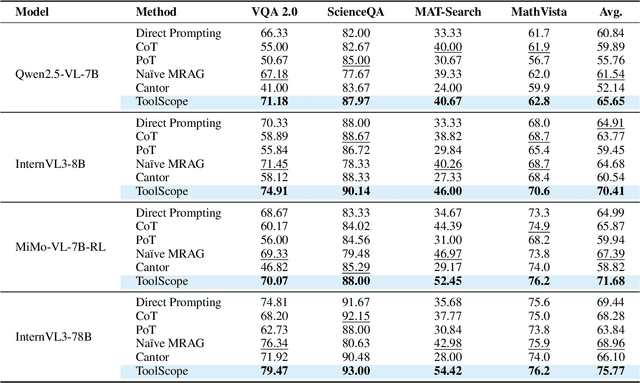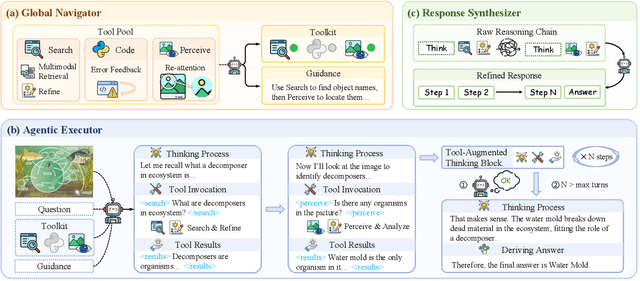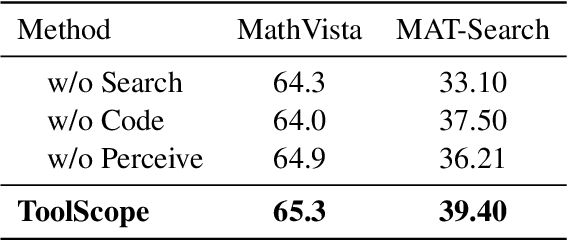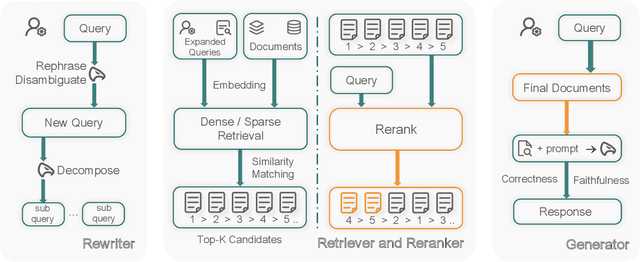Guanting Dong
ET-Agent: Incentivizing Effective Tool-Integrated Reasoning Agent via Behavior Calibration
Jan 11, 2026Abstract:Large Language Models (LLMs) can extend their parameter knowledge limits by adopting the Tool-Integrated Reasoning (TIR) paradigm. However, existing LLM-based agent training framework often focuses on answers' accuracy, overlooking specific alignment for behavior patterns. Consequently, agent often exhibits ineffective actions during TIR tasks, such as redundant and insufficient tool calls. How to calibrate erroneous behavioral patterns when executing TIR tasks, thereby exploring effective trajectories, remains an open-ended problem. In this paper, we propose ET-Agent, a training framework for calibrating agent's tool-use behavior through two synergistic perspectives: Self-evolving Data Flywheel and Behavior Calibration Training. Specifically, we introduce a self-evolutionary data flywheel to generate enhanced data, used to fine-tune LLM to improve its exploration ability. Based on this, we implement an two-phases behavior-calibration training framework. It is designed to progressively calibrate erroneous behavioral patterns to optimal behaviors. Further in-depth experiments confirm the superiority of \ourmodel{} across multiple dimensions, including correctness, efficiency, reasoning conciseness, and tool execution accuracy. Our ET-Agent framework provides practical insights for research in the TIR field. Codes can be found in https://github.com/asilverlight/ET-Agent
EnvScaler: Scaling Tool-Interactive Environments for LLM Agent via Programmatic Synthesis
Jan 09, 2026Abstract:Large language models (LLMs) are expected to be trained to act as agents in various real-world environments, but this process relies on rich and varied tool-interaction sandboxes. However, access to real systems is often restricted; LLM-simulated environments are prone to hallucinations and inconsistencies; and manually built sandboxes are hard to scale. In this paper, we propose EnvScaler, an automated framework for scalable tool-interaction environments via programmatic synthesis. EnvScaler comprises two components. First, SkelBuilder constructs diverse environment skeletons through topic mining, logic modeling, and quality evaluation. Then, ScenGenerator generates multiple task scenarios and rule-based trajectory validation functions for each environment. With EnvScaler, we synthesize 191 environments and about 7K scenarios, and apply them to Supervised Fine-Tuning (SFT) and Reinforcement Learning (RL) for Qwen3 series models. Results on three benchmarks show that EnvScaler significantly improves LLMs' ability to solve tasks in complex environments involving multi-turn, multi-tool interactions. We release our code and data at https://github.com/RUC-NLPIR/EnvScaler.
SmartSearch: Process Reward-Guided Query Refinement for Search Agents
Jan 08, 2026Abstract:Large language model (LLM)-based search agents have proven promising for addressing knowledge-intensive problems by incorporating information retrieval capabilities. Existing works largely focus on optimizing the reasoning paradigms of search agents, yet the quality of intermediate search queries during reasoning remains overlooked. As a result, the generated queries often remain inaccurate, leading to unexpected retrieval results and ultimately limiting search agents' overall effectiveness. To mitigate this issue, we introduce SmartSearch, a framework built upon two key mechanisms: (1) Process rewards, which provide fine-grained supervision for the quality of each intermediate search query through Dual-Level Credit Assessment. (2) Query refinement, which promotes the optimization of query generation by selectively refining low-quality search queries and regenerating subsequent search rounds based on these refinements. To enable the search agent to progressively internalize the ability to improve query quality under the guidance of process rewards, we design a three-stage curriculum learning framework. This framework guides the agent through a progression from imitation, to alignment, and ultimately to generalization. Experimental results show that SmartSearch consistently surpasses existing baselines, and additional quantitative analyses further confirm its significant gains in both search efficiency and query quality. The code is available at https://github.com/MYVAE/SmartSearch.
V-Thinker: Interactive Thinking with Images
Nov 06, 2025Abstract:Empowering Large Multimodal Models (LMMs) to deeply integrate image interaction with long-horizon reasoning capabilities remains a long-standing challenge in this field. Recent advances in vision-centric reasoning explore a promising "Thinking with Images" paradigm for LMMs, marking a shift from image-assisted reasoning to image-interactive thinking. While this milestone enables models to focus on fine-grained image regions, progress remains constrained by limited visual tool spaces and task-specific workflow designs. To bridge this gap, we present V-Thinker, a general-purpose multimodal reasoning assistant that enables interactive, vision-centric thinking through end-to-end reinforcement learning. V-Thinker comprises two key components: (1) a Data Evolution Flywheel that automatically synthesizes, evolves, and verifies interactive reasoning datasets across three dimensions-diversity, quality, and difficulty; and (2) a Visual Progressive Training Curriculum that first aligns perception via point-level supervision, then integrates interactive reasoning through a two-stage reinforcement learning framework. Furthermore, we introduce VTBench, an expert-verified benchmark targeting vision-centric interactive reasoning tasks. Extensive experiments demonstrate that V-Thinker consistently outperforms strong LMM-based baselines in both general and interactive reasoning scenarios, providing valuable insights for advancing image-interactive reasoning applications.
ToolScope: An Agentic Framework for Vision-Guided and Long-Horizon Tool Use
Oct 31, 2025



Abstract:Recently, large language models (LLMs) have demonstrated remarkable problem-solving capabilities by autonomously integrating with external tools for collaborative reasoning. However, due to the inherently complex and diverse nature of multimodal information, enabling multimodal large language models (MLLMs) to flexibly and efficiently utilize external tools during reasoning remains an underexplored challenge. In this work, we introduce ToolScope, an agentic framework designed to unify global planning with local multimodal perception, adopting a specialized Perceive tool to mitigates visual context degradation in long-horizon VQA task. ToolScope comprises three primary components: the Global Navigator, the Agentic Executor, and the Response Synthesizer. The Global Navigator functions as a "telescope", offering high-level strategic guidance. The Agentic Executor operates iteratively to augment MLLM with local perception through the integration of external tools-Search, Code, and Perceive. Finally, the Response Synthesizer consolidates and organizes the reasoning process into a coherent, user-friendly output. We evaluate ToolScope on four VQA benchmarks across diverse domains, including VQA 2.0, ScienceQA, MAT-Search and MathVista. It demonstrates strong generalization capabilities, achieving an average performance improvement of up to +6.69% across all datasets.
DeepAgent: A General Reasoning Agent with Scalable Toolsets
Oct 24, 2025Abstract:Large reasoning models have demonstrated strong problem-solving abilities, yet real-world tasks often require external tools and long-horizon interactions. Existing agent frameworks typically follow predefined workflows, which limit autonomous and global task completion. In this paper, we introduce DeepAgent, an end-to-end deep reasoning agent that performs autonomous thinking, tool discovery, and action execution within a single, coherent reasoning process. To address the challenges of long-horizon interactions, particularly the context length explosion from multiple tool calls and the accumulation of interaction history, we introduce an autonomous memory folding mechanism that compresses past interactions into structured episodic, working, and tool memories, reducing error accumulation while preserving critical information. To teach general-purpose tool use efficiently and stably, we develop an end-to-end reinforcement learning strategy, namely ToolPO, that leverages LLM-simulated APIs and applies tool-call advantage attribution to assign fine-grained credit to the tool invocation tokens. Extensive experiments on eight benchmarks, including general tool-use tasks (ToolBench, API-Bank, TMDB, Spotify, ToolHop) and downstream applications (ALFWorld, WebShop, GAIA, HLE), demonstrate that DeepAgent consistently outperforms baselines across both labeled-tool and open-set tool retrieval scenarios. This work takes a step toward more general and capable agents for real-world applications. The code and demo are available at https://github.com/RUC-NLPIR/DeepAgent.
We-Math 2.0: A Versatile MathBook System for Incentivizing Visual Mathematical Reasoning
Aug 14, 2025Abstract:Multimodal Large Language Models (MLLMs) have demonstrated impressive capabilities across various tasks, but still struggle with complex mathematical reasoning. Existing research primarily focuses on dataset construction and method optimization, often overlooking two critical aspects: comprehensive knowledge-driven design and model-centric data space modeling. In this paper, we introduce We-Math 2.0, a unified system that integrates a structured mathematical knowledge system, model-centric data space modeling, and a reinforcement learning (RL)-based training paradigm to comprehensively enhance the mathematical reasoning abilities of MLLMs. The key contributions of We-Math 2.0 are fourfold: (1) MathBook Knowledge System: We construct a five-level hierarchical system encompassing 491 knowledge points and 1,819 fundamental principles. (2) MathBook-Standard & Pro: We develop MathBook-Standard, a dataset that ensures broad conceptual coverage and flexibility through dual expansion. Additionally, we define a three-dimensional difficulty space and generate 7 progressive variants per problem to build MathBook-Pro, a challenging dataset for robust training. (3) MathBook-RL: We propose a two-stage RL framework comprising: (i) Cold-Start Fine-tuning, which aligns the model with knowledge-oriented chain-of-thought reasoning; and (ii) Progressive Alignment RL, leveraging average-reward learning and dynamic data scheduling to achieve progressive alignment across difficulty levels. (4) MathBookEval: We introduce a comprehensive benchmark covering all 491 knowledge points with diverse reasoning step distributions. Experimental results show that MathBook-RL performs competitively with existing baselines on four widely-used benchmarks and achieves strong results on MathBookEval, suggesting promising generalization in mathematical reasoning.
Klear-Reasoner: Advancing Reasoning Capability via Gradient-Preserving Clipping Policy Optimization
Aug 12, 2025



Abstract:We present Klear-Reasoner, a model with long reasoning capabilities that demonstrates careful deliberation during problem solving, achieving outstanding performance across multiple benchmarks. Although there are already many excellent works related to inference models in the current community, there are still many problems with reproducing high-performance inference models due to incomplete disclosure of training details. This report provides an in-depth analysis of the reasoning model, covering the entire post-training workflow from data preparation and long Chain-of-Thought supervised fine-tuning (long CoT SFT) to reinforcement learning (RL), along with detailed ablation studies for each experimental component. For SFT data, our experiments show that a small number of high-quality data sources are more effective than a large number of diverse data sources, and that difficult samples can achieve better results without accuracy filtering. In addition, we investigate two key issues with current clipping mechanisms in RL: Clipping suppresses critical exploration signals and ignores suboptimal trajectories. To address these challenges, we propose Gradient-Preserving clipping Policy Optimization (GPPO) that gently backpropagates gradients from clipped tokens. GPPO not only enhances the model's exploration capacity but also improves its efficiency in learning from negative samples. Klear-Reasoner exhibits exceptional reasoning abilities in mathematics and programming, scoring 90.5% on AIME 2024, 83.2% on AIME 2025, 66.0% on LiveCodeBench V5 and 58.1% on LiveCodeBench V6.
Decoupled Planning and Execution: A Hierarchical Reasoning Framework for Deep Search
Jul 03, 2025Abstract:Complex information needs in real-world search scenarios demand deep reasoning and knowledge synthesis across diverse sources, which traditional retrieval-augmented generation (RAG) pipelines struggle to address effectively. Current reasoning-based approaches suffer from a fundamental limitation: they use a single model to handle both high-level planning and detailed execution, leading to inefficient reasoning and limited scalability. In this paper, we introduce HiRA, a hierarchical framework that separates strategic planning from specialized execution. Our approach decomposes complex search tasks into focused subtasks, assigns each subtask to domain-specific agents equipped with external tools and reasoning capabilities, and coordinates the results through a structured integration mechanism. This separation prevents execution details from disrupting high-level reasoning while enabling the system to leverage specialized expertise for different types of information processing. Experiments on four complex, cross-modal deep search benchmarks demonstrate that HiRA significantly outperforms state-of-the-art RAG and agent-based systems. Our results show improvements in both answer quality and system efficiency, highlighting the effectiveness of decoupled planning and execution for multi-step information seeking tasks. Our code is available at https://github.com/ignorejjj/HiRA.
Leveraging LLM-Assisted Query Understanding for Live Retrieval-Augmented Generation
Jun 26, 2025


Abstract:Real-world live retrieval-augmented generation (RAG) systems face significant challenges when processing user queries that are often noisy, ambiguous, and contain multiple intents. While RAG enhances large language models (LLMs) with external knowledge, current systems typically struggle with such complex inputs, as they are often trained or evaluated on cleaner data. This paper introduces Omni-RAG, a novel framework designed to improve the robustness and effectiveness of RAG systems in live, open-domain settings. Omni-RAG employs LLM-assisted query understanding to preprocess user inputs through three key modules: (1) Deep Query Understanding and Decomposition, which utilizes LLMs with tailored prompts to denoise queries (e.g., correcting spelling errors) and decompose multi-intent queries into structured sub-queries; (2) Intent-Aware Knowledge Retrieval, which performs retrieval for each sub-query from a corpus (i.e., FineWeb using OpenSearch) and aggregates the results; and (3) Reranking and Generation, where a reranker (i.e., BGE) refines document selection before a final response is generated by an LLM (i.e., Falcon-10B) using a chain-of-thought prompt. Omni-RAG aims to bridge the gap between current RAG capabilities and the demands of real-world applications, such as those highlighted by the SIGIR 2025 LiveRAG Challenge, by robustly handling complex and noisy queries.
 Add to Chrome
Add to Chrome Add to Firefox
Add to Firefox Add to Edge
Add to Edge